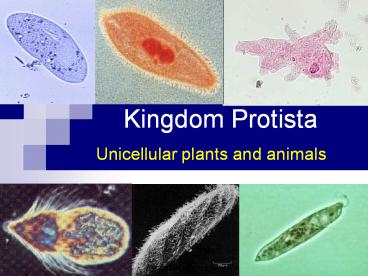Kingdom Protista - PowerPoint PPT Presentation
Title:
Kingdom Protista
Description:
Kingdom Protista Unicellular plants and animals General Information Protista, from the Greek protistos = first Diverse group Aka Algae & Protozoa Most are Unicellular ... – PowerPoint PPT presentation
Number of Views:2174
Avg rating:3.0/5.0
Title: Kingdom Protista
1
Kingdom Protista
- Unicellular plants and animals
2
General Information
- Protista, from the Greek protistos first
- Diverse group
- Aka Algae Protozoa
- Most are Unicellular
- exception Volvox is colonial
3
Characteristics
- A. Eukaryotic
- (have a nucleus)
4
Characteristics
- B. Many feeding patterns
- some plant-like, (autotrophs)
- some animal-like, (heterotrophs)
- some fungus-like(absorb food from the dead)
- some parasite-like (pathogens, eat the living)
5
Characteristics
- C. Big or tiny
- D. Unicellular or colonial
- E.Have weird features, like photosensitive areas
(eyespots)
6
3. Habitats
- Almost anywhere there is water
7
4. Reproduction
- Asexual
- Sexual
- Both, alternating
8
Ciliophora - Conjugation
9
Reproduction
- Alternation of Generations
- ? switch btwn. asexual repro. (spores)
- sexual repro. (gametes) back again
10
5. Specialized Cells
- Cells specialized for f(x)s
- Division of labor
- E.g. holdfast cell, gamete-forming cells
Holdfast cell
11
6. Classification by Exclusion
- ? If organism doesnt belong in any other phylum,
put it in this one! - I.e. Weirdos go in this group!
12
7. Protist Groups
- Pseudopodia for locomotion
- false feet
- Animal-like, parasites
- AMOEBAS
- E.g. ?Amoeba
- E.g. Entamoeba histolytica
- (amoebic dysentary)
13
7. Protist Groups
- b. Foraminifera
- Source of CaCO3
- (calcium carbonate / chalk)
- E.g. The
- white cliffs
- of Dover
14
7. Protist Groups
- c. Diatoms
- Photosynthetic, unicellular, double shells
- of SiO3(glass)
15
7. Protist Groups
- d. Green Algae
- plant-like protists
- E.g. ?Volvox
16
7. Protist Groups
- e. Red Algae
Source of agar (growth medium for bacteria)
17
8. Protist Groups
- f. Brown Algae
- E.g.
- kelp
18
7. Protist Groups
- g. Dinoflagellates
- Protists with Flagella (animal-like)
- Capable of bioluminescence
- (glowing in the dark)
- the red tide
- makes scallops
- toxic to humans
19
Red (Crimson) Tide
20
7. Protist Groups
?Causes giardia / backpackers disease
?Trichonympha in termites digest wood
(cellulose)
21
8. Protist Groups
- h. Euglenoids e.g. ?Euglena
- ?use flagella to move
22
7. Protist Groups
- i. Cilia for locomotion -Ciliates)
- ?Paramecium
23
7. Protist Groups
- j. Slime Molds
- Multicellular
- Single cellular
24
7. Protist Groups
- k. Water Molds
- E.g. potato blight
- Caused potato famine
- in Ireland
- 1845-1847
- 400,000 starved
25
7. Protist Groups
- l. ?Sporozoans
- Cannot move themselves
- Move via vectors (things that carry them)
26
l. ?Sporozoans
- EXAMPLES
- E.g. Plasmodium (causes malaria)
- vector Anopheles mosquito
- E.g. Toxoplasmolysis (from cat feces
- causes fetal death)
- E.g. African sleeping sickness
- vector tsetse fly































